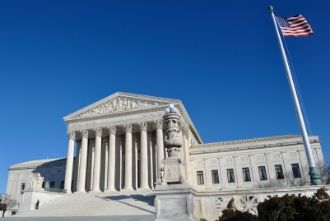
THE SUPREME COURT ALLOWS THE RESTRICTIVE PUBLIC CHARGE RULE TO GO INTO EFFECT
On January 27, 2020, the U.S. Supreme Court lifted an injunction on the updated USCIS Public Charge regulation, thereby allowing enforcement of the regulation to proceed while litigation continues. However, the preliminary injunction continues to apply to the State of Illinois.
On January 30, 2020, USCIS announced that it will implement and enforce the Inadmissibility on Public Charge Grounds final rule starting on February 24, 2020. A long-standing Immigration and Nationality Act (INA) public charge provision establishes that applicants for a visa, admission, or adjustment of status are inadmissible to the United States if they are likely at any time to become a public charge. INA 212(a)(4), 8 USC 1182(a)(4) provides:
“Any alien who, in the opinion of the consular officer at the time of application for a visa, or in the opinion of the Attorney General at the time of application for admission or adjustment of status, is likely at any time to become a public charge is inadmissible.”
The statute requires Department of State (DOS) and U.S. Citizenship and Immigration Services (USCIS) to consider the following factors in reaching a “public charge” determination:
- age
- health
- family status
- assets, resources, and financial status
- education and skills
The new rule places a substantial amount of discretion in the hands of USCIS and Consular Officers, given that the statute does not define the term “public charge” nor provide any definitive instructions on how “age, health, family status, assets, resources, financial status, education and skills” should be assessed in determining whether a person is likely to become a public charge “at any time” in the future.
WHAT CHANGES SHOULD BE EXPECTED UNDER THIS NEW RULE?
The new Public Charge rules requires USCIS and the State Department to consider the totality of the circumstances (relying on the above factors) in determining whether applicants for a green card or temporary visa are likely to become a public charge “at any time” in the future.
Applicants should be fully aware that the usage of “public benefits” will weigh heavily as a negative factor. DHS will only consider public benefits received on or after February 24, 2019 for petitions or applications postmarked on or after that date.
WHAT PUBLIC BENEFITS WILL USCIS CONSIDER?
USCIS has expanded the list of benefits that are considered “public benefits” to include the following:
- Supplemental Security Income (SSI)
- Temporary Assistance for Needy Families (TANF)
- Any federal, state, local or tribal cash assistance for income maintenance
- Medicaid (with limited exceptions)
- Supplemental Nutrition Assistance Program (SNAP, formerly known as food stamps)
- Any benefits related to institutionalization for long-term care at government expense
- Section 8 Housing Choice Voucher Program and Rental Assistance Program
NEW FORM FOR THE USCIS GREEN CARD PROCESS
USCIS will create a new form, Form I-944, Declaration of Self-Sufficiency, on which I-485 Adjustment of Status applicants will have to provide information to establish that they are not likely to become a “public charge.” The new public charge determination criteria and Form I-944 will be required for adjustment of status applications postmarked on and after February 24, 2020.
For now, it is simply not known how strictly USCIS and the U.S. State Department will apply these new rules. We fully anticipate a period of decision making where there is a noticeable “lack of consistency” in how the public charge rule is applied in case decisions. Levine & Eskandari, LLC attorneys will continue to monitor this issue and post on any significant new developments.
TESTIMONIALS
"We would highly recommend Layli Eskandari Deal's services to anyone that is in need of a dedicated immigration lawyer." -Avvo Review
"Ken is a lifesaver and ... was completely different and had no qualms about my case, and assured me that it would work out. I was not disappointed" - Avvo Review
"She went above and beyond her call of duty and standardly recognized level of interest in my case and her legal responsibilities as my attorney." - Avvo Review
"Ken was very helpful and diligent with the work. Got me an L1B, then a H1B visa renewed 2 or 3 times, and finally a green card. Great work!" - Avvo Review
WE CAN HELP
We'd love to speak with you about your situation. Every case is different and needs personalized attention from experienced immigration laywers. Your new team is waiting to hear from you.
